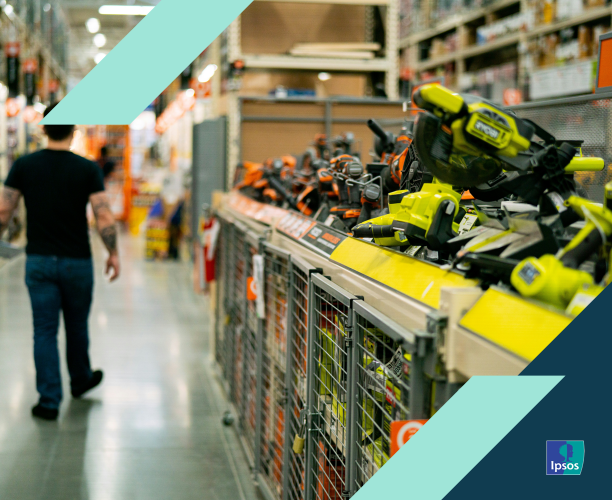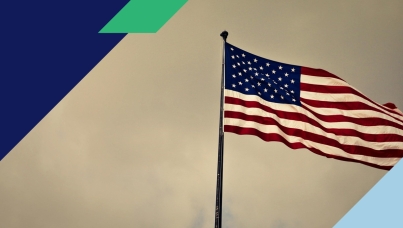

The economy: Key insights, data and solutions on inflation, recession, consumer confidence and more
When it comes to the current economic outlook in the U.S., uncertainty abounds. Ipsos data can help. Here’s our latest research on the economy – from tariffs and stagflation to the cost-of-living crisis – and exclusive insights on what it means for brands, businesses, policymakers, and people.
Key takeaways:
Americans are divided on the economy under Trump
- Majorities of Democrats (84%) and independents (52%) say the economy has gotten worse since Trump became president; 69% of Republicans say the economy has gotten better.
Most Americans aren't buying the benefits of tariffs
- A significant number of Americans (42%) disagree that tariffs will lead to more jobs in the U.S., while only 28% (42% of Republicans) agree it’s a job creator. Meanwhile, a sizable majority (73%, even 60% of Republicans) say that tariffs will lead to higher prices and 67% say they are already paying higher prices.
Americans say they want to save more money in 2026
- We know from previous waves that budgeting is hard for folks, but 68% of Americans resolved to stick to their budget in 2026.
Consumer budgets are crunched
- Amidst tariffs, a government shutdown, and all-around economic uncertainty, Americans are tightening their budgets. In October 2025, the Ipsos Consumer Tracker found that a majority of people at every income level have cut back on at least one expense. In September, it found
Americans aren’t buying the benefits of tariffs
A significant number of Americans (42%) disagree that tariffs will lead to more jobs in the U.S., while only 28% (42% of Republicans) agree it’s a job creator. Meanwhile, a sizable majority (73%, even 60% of Republicans) say that tariffs will lead to higher prices and 67% say they are already paying higher prices. Only 35% think tariffs are worth it, with just half of Republicans (52%) agreeing and only one in five (22%) of Democrats. (Read more.)
More Americans are cutting back on streaming and repairs
Seven in ten are spending more on food at home and less on dining out and travel. Four in ten have put off a vacation, or a big-ticket purchase like an appliance, car or home renovation. But the growing areas of cutbacks are streaming services (39% have canceled one in the last six months, up from 31% two years ago) and home and car repairs (also 39%, up from 27%). (Read more.)
Nearly half of Americans don’t have any cash left over after paying bills
The number of Americans who say that they don’t have any money left over after paying their bills is up 7 points from May to 48%, which ties a high not seen since August of 2022, when inflation rates were in the middle of their steep post-pandemic climb. (Read more.)
Lower and middle earners split on taking on or paying down debt this year
In terms of debt and credit, a plurality of both households making under $50,000 and those making over $100,000 have neither taken on more debt, nor paid down debt since the start of the year. The upper-income households are twice as likely to have paid down debt (39%) as taken on more debt (17%). But those in the middle are more likely to have had a change, and are evenly split – 36% say they have taken on more debt and 38% say they have paid down debt.(Read more.)
Fewer Americans are planning to cut back on items due to tariffs
Across each of the product categories we asked about, none saw a rise in people saying they would cut back. Some more discretionary purchases (books, large electronics, alcoholic beverages) saw reasonable declines even. For the more necessary purchases (food, snacks, dairy, household goods) there was very little movement since the last time we asked in April. (Read more.)
American attitudes to Trump’s economic policies
Even Americans do not fully support the ‘America First’ approach. Americans are more likely to think that the President’s economic policies will negatively affect their finances than benefit them (41% to 33%). They also think it will have a negative impact on the US economy (48%) and the global economy (46%). (Read more.)
Despite overall uncertainty, we are somewhat confident in spending
Our confidence in spending on bigger ticket items is pretty stable since the last time we asked this in (checks note) November, 2023. That seems like an eon ago and a very different world. But despite all of the uncertainty we see in the Vibe Check and the Ipsos Consumer Confidence Index, about as many are confident in investing, or taking out loans or buying a new home. (Read more.)
Half of Americans don't know what will be tariffed
Nearly three in four Americans now think tariffs will raise prices on the goods they buy, including a majority of Republicans. And slightly more (31%, up 5 points from early February) say they are stocking up on items they think will be impacted. (Read more.)
Four in five Americans are concerned about the cost of living, rising inflation
Americans remain highly concerned with inflation and the cost of living. Fewer, but still majorities, are concerned about a potential recession or the stock market. But what is clear: economic anxieties are widespread. (Read more.)
How tariffs could impact product categories
We tested 12 categories, from large electronics, to snacks, to staples like paper products. In each, more would cut back than stock up. Household categories like dairy, detergents and cleaners, paper products and over-the-counter medications found people saying there would be no impact, they just need to keep buying them even if they cost 10% more. But for items that are more discretionary, at least one in three said they would have to cut back. (Read more.)
Less than half of Americans support Trump's tariffs
Less than half of Americans support tariffs, but support is unsurprisingly divided across partisan lines. Two Americas: one red, one blue. (Read more.)
U.S. tariffs set social media on fire around the world
Across languages, continents and social platforms, conversations around tariffs grew more than 600% between April 1 and April 3, and have remained elevated since. And the tone of the conversation is clear, according to Synthesio’s AI-powered sentiment analysis: 79% of mentions have been negative, with only 6% positive and 15% neutral. (Read more.)
Most Americans expect the prices of a variety of goods will increase
Most Americans say prices on a variety of goods will increase due to tariffs, while just one in five say they have seen grocery or gasoline costs go down in the last three months. Two in five say they have had to delay making a purchase because they didn’t have the money (39%), 21% say they have been unable to pay a bill on time, and 16% say they had to go into debt or use retirement savings to make ends meet (16%) over the last three months. These levels are roughly in line with previous Ipsos polls conducted in late 2024 and early 2025. (Read more.)
Most Americans think a recession is coming
61% overall think the U.S. is headed for a recession in the next year. And only 24% think the economic news they read is positive. But under that are huge party splits: Nearly twice as many Democrats as Republicans think the recession is coming (82% vs 44%). And Republicans are more than twice as likely to be getting positive economic news (41% vs 16%). (Read more.)
Americans feel the economy, national politics are on the wrong track
Forty-nine percent of Americans say that the country is headed off on the wrong track, 34% of say that the country is headed in the right direction and 16% don't know. When it comes to specific issues, a majority of Americans also believe that the national economy (53%) is off on the wrong track, as is their cost of living (64%). A plurality say that employment and jobs (44%) are also off on the wrong track. (Read more.)
Americans agree that the economy should be a political priority
Americans are most concerned about political extremism, the economy and immigration. By party affiliation, Republicans are most concerned about the economy and immigration, while nearly half of Democrats are most concerned about political extremism or threats to democracy, and independents are split between the economy and political extremism as the most important issues. (Read more.)
Are people feeling tariff price increases already?
An increasingly large majority (now 70%) believe that tariffs will raise prices on the goods they buy. But only one in three think it’s fair for companies to pass along the cost of tariffs in the form of higher prices. (Read more.)
Some new signs Americans are worried about their budgets
Since October, we've seen an uptick in people looking to reduce their recurring overhead, or finance it. More people said they’d cut back on cable (28%, an increase of 6 points), streaming services (33%, +7 points) eliminate landline phone service (20%, +7 points), and open a new credit card (25%, +6 points). And in a related question, we see slightly more say they are going to move money to safer investments (20%, +5 points). (Read more.)
Inflation tied with crime and violence for top concern across 29 global countries
Inflation as a worry across 29 countries remains at 32% expressing concern. Following President Trump’s announcement of tariffs on Canada, concern over rising prices among Canadians has surged, with the proportion expressing worry climbing five percentage points to 49%. However, this uptick is not unprecedented — February 2024 recorded an even higher peak, marking the highest level of concern that year, five points above the current figure. (Read more.)
Further reading
- People are not fans of dynamic pricing — January 16, 2026
- What do we think 2026 will look like? — January 16, 2026
- Fewer Americans are planning to cut back on items due to tariffs — August 4, 2025
- Storm clouds on the horizon — July 25, 2025
- American attitudes to Trump’s economic policies — June 18, 2025
- Despite overall uncertainty, we are somewhat confident in spending — June 9, 2025
- Half of Americans want tariff price labels, and are unsure what's being tariffed — May 27, 2025
- Here's what Americans think they'll cut back on due to tariffs — April 29, 2025
- Americans have a negative economic outlook, even as many feel their personal economic situation hasn't changed — April 27, 2025
- Trump’s trade war with China — April 11, 2025
- How U.S. tariffs set social media on fire around the world — April 11, 2025
- How the public felt about tariffs leading up to Liberation Day — April 5, 2025
- Americans unhappy with the direction of the cost of living — April 3, 2025
- Most Americans think a recession is coming — April 2, 2025
- More small businesses cite revenue as a concern — March 26, 2025
- Are people feeling tariff price increases already? — February 19, 2025
- February 2025 LSEG/Ipsos Primary Consumer Sentiment Index — February 18, 2025
- New signs show Americans are worried about budgets — January 18, 2025
- Here's what Americans actually did during the holidays — January 18, 2025
- Most think tariffs will increase prices, but aren’t doing anything about it — January 18, 2025
- Most people don’t know how tariffs work (and some even admit that) – December 13, 2024
- Inflation rates may be falling, but people expect further price rises — November 29, 2024
- Expectations of the economy in a second Trump presidency — November 22, 2024
- Older Americans are least confident after Trump's win — November 20, 2024
- How the economy is impacting Americans’ holiday plans — November 6, 2024
- More younger people are hoarding cash; Dems are using coupons — November 6, 2024
- Is Buy Now, Pay Later here to stay? Here's what the data says — July 31, 2024
- Why all brands need to care about a financial services revolution — July 25, 2024
- How younger Americans use credit cards to make ends meet — May 8, 2024
- More say they can save money as mixed bag of economic opinions continues — May 3, 2024
- February 2024: Consumer confidence among G7 countries — February 26, 2024
- The economics of your wallet are most important to Americans — February 20, 2024
- Money fights: One in three (34%) partnered Americans identify money as a source of conflict in their relationship — February 9, 2024
- Why are Americans still so pessimistic about the economy? — February 9, 2024
- Affluent Outlook 2024: Cleared for takeoff? — February 7, 2024
- Why Americans' future economic expectations remain pessimistic — February 6, 2024
- Gas prices are falling, and people are starting to notice — January 26, 2024
- Americans feel more confident about their financial future than they did one year ago — December 12, 2023
- Half of Americans are saving more for a safety net — November 21, 2023
- Registered voters are feeling pessimistic about the state of the U.S. economy — November 7, 2023
- Consumers are pinched and leaning on debt — October 13, 2023
- 21% of parents globally say their children have gone to bed hungry in the last month — October 12, 2023
- Americans look to generate additional income streams as they report high levels of financial anxiety — October 2, 2023
- Americans on strike — September 22, 2023
- Ipsos Global Consumer Confidence Index — August 23, 2023
- Another round of mixed economic signals — August 21, 2023
- The economy is getting better. Why isn't Biden getting any credit? — August 11, 2023
- Reuters/Ipsos Survey: Perceptions of the economy impact Biden's approval and chances in 2024 — August 7, 2023
- Elections amid an evolving economy — July 21, 2023
- Feeling the pressure? Consumers and the polycrisis — July 6, 2023
- Nine in ten small businesses agree they are the most vulnerable to rising interest rates — June 28, 2023
- Americans are satisfied with their lives — except for their salaries — June 27, 2023
- People are delaying, rather than buying, big-ticket items — May 26, 2023
- Consumer coping strategies in the cost of living crisis — May 25, 2023
- Half of the public across 29 countries think their country is in recession — May 24, 2023
- How inflation hits Americans of color harder — April 18, 2023
- A confusing economy — March 1, 2023
- Staring down inflation: Affluents’ financial outlooks for 2023 — February 28, 2023
- Data Dive: Optimism takes a hit amid ‘permacrisis’ — January 30, 2023
- Social media users’ 2023 resolutions: health and finances first — January 6, 2023
- Inflation has citizens’ around the world pointing a finger at government policies — December 20, 2022
- Data Dive: Global consumer confidence softens in 2022 — December 9, 2022
- Inflation: Seven in ten expect prices to continue to rise in 2023 — November 29, 2022
- Feeling the pressure: Understanding consumers during inflationary times — November 29, 2022
- Global consumer confidence continues to show stability — November 16, 2022
- As companies tackle inflation, a generation gap looms — November 8, 2022
- 5 keys to successful advertising in inflationary times — November 8, 2022
- The courage to grow in inflationary times — October 17, 2022
- What the Future: Spending — September 28, 2022
- High food prices are taking a bite out of budgets — September 7, 2022
- Data Dive: Here’s how people are feeling about inflation around the world — August 30, 2022
- Here’s what inflation is changing (and what it isn’t) — August 5, 2022
- Four in ten across 28 countries expect their disposable income to fall over the next year — July 30, 2022
- Worry about inflation hits new heights globally — May 17, 2022
- A quarter are struggling financially and public expectations are for further inflation and price rises over 2022
- No kids during pandemic? Financial concerns No. 1 reason for people delaying or not having babies — April 13, 2022
- All things inflation — April 15, 2022
- Innovation in Inflationary Times — March 18, 2022
- Consumers worldwide report experiencing higher prices — December 14, 2021
- What the Future: Buying — 2021
- What the Future: Wealth — 2021
- What the Future: Spending — 2021
- What the Future: Money — 2020
Ipsos capabilities and offers
- Ipsos Inflation Essentials
- Inside Inflation: What Comms Next?
- Strategic guidance & learnings for advertising at scale in times of inflation
- How is inflation impacting consumer behaviors, attitudes and emotions?
- Communicate around price and value in times of inflation
- What are customers’ expectations and needs of brands, as the cost-of-living increases?




